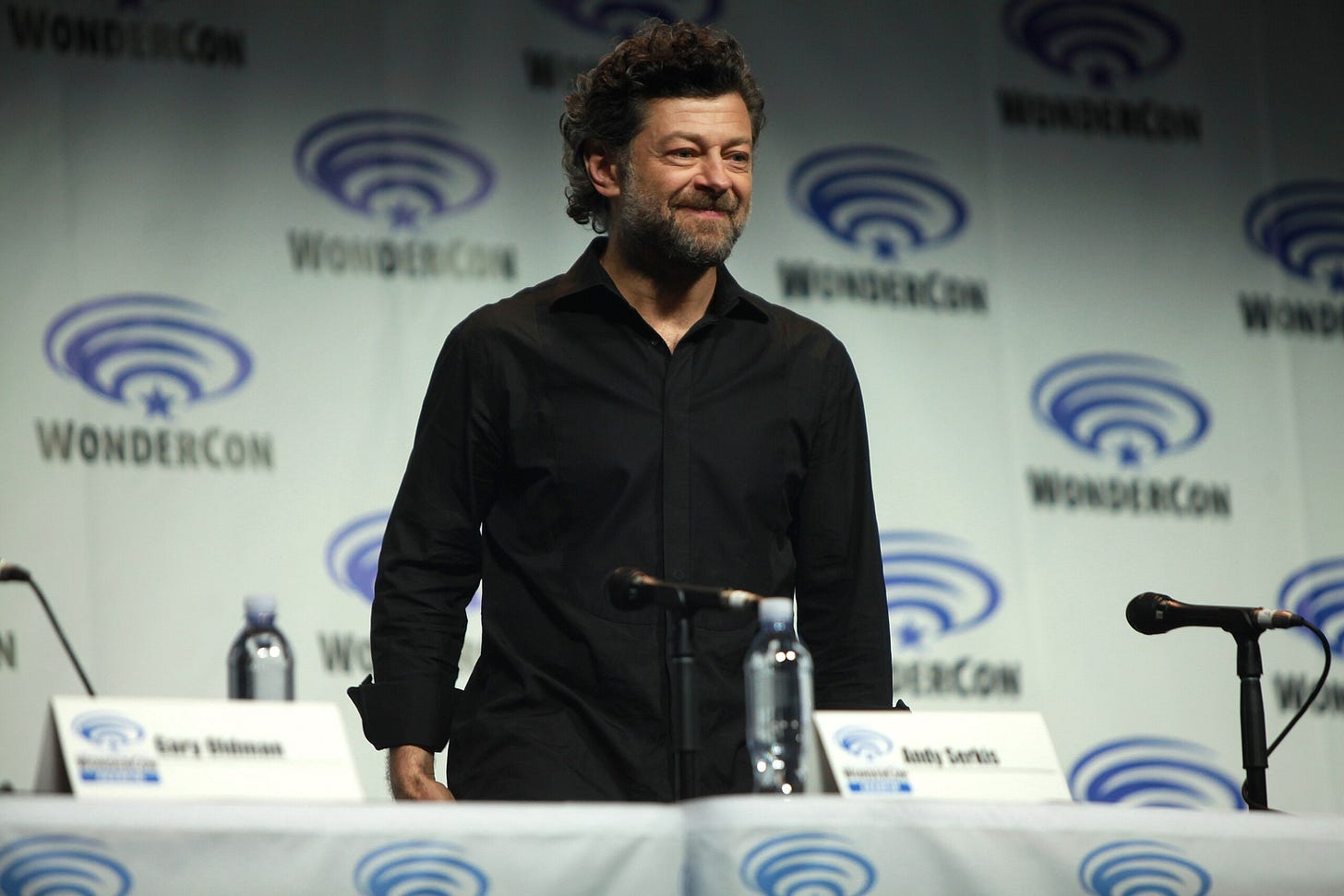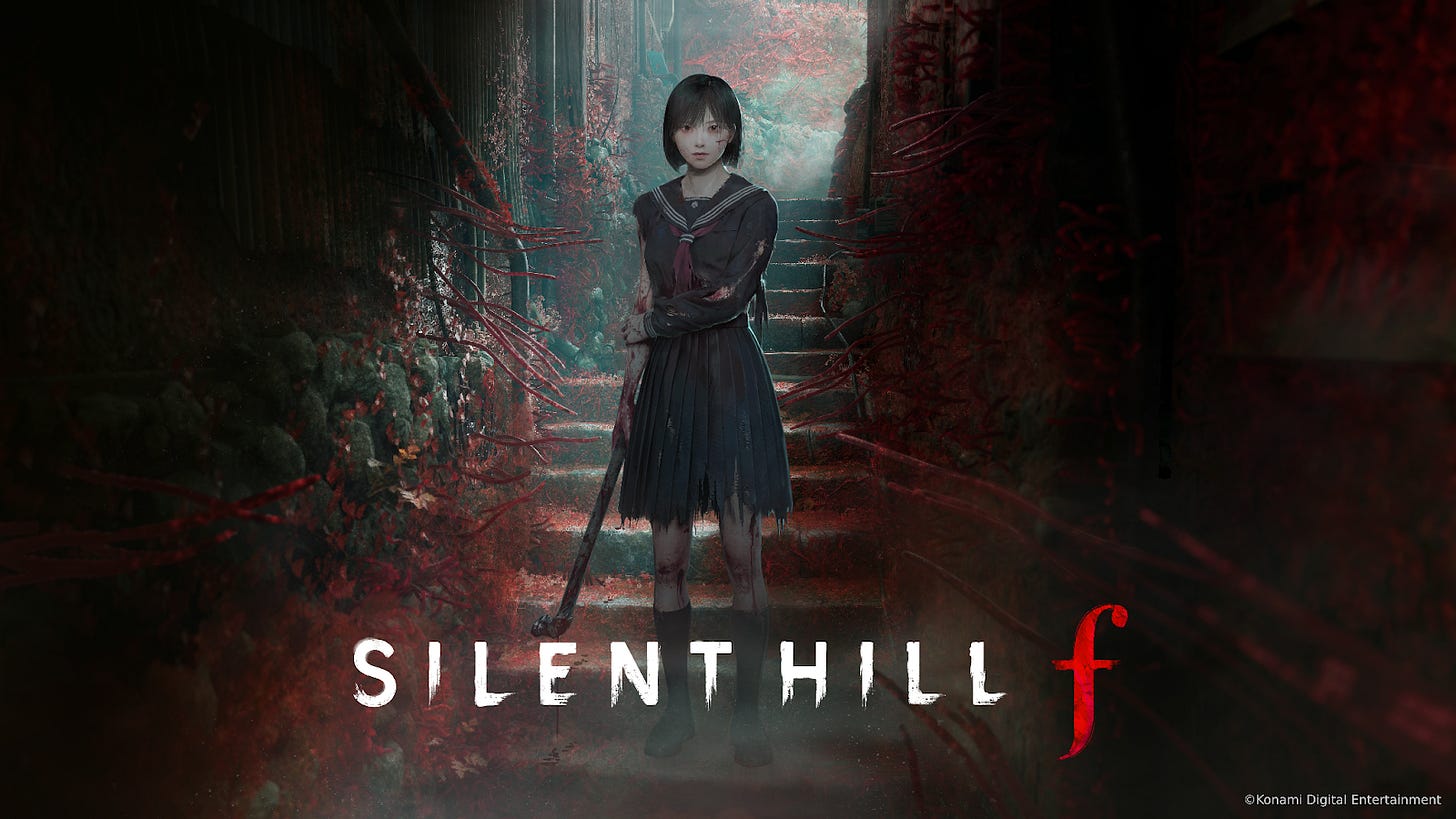A star studded games console state of play, 07/08/2025
Andy Serkis, Henk Rogers, and the sweary guy from Hazelight weigh in on the state of play for games consoles (and the industry at large)
Andy Serkis, Henk Rogers, Pierre Farno, and more weigh in on what’s next for game consoles.
Disney and Epic Games’ working relationship is called into question.
We get spooky with Silent Hill F, the franchise’s first Japan-set outing.
Hey there VGIM-ers,
Tom here, once again sliding his way back into your inbox for the second week running.
I know, I know. This isn’t what you subscribed to. You’re rightly here to gorge on George.
But while Mr Osborn is away penning his masterpiece, another newsletter I shall forge.
It’s been a brilliant, if incredibly busy month, for Regan Industries (the lofty name I give to my freelance career to make me feel better about writing alone in cafes).
After schlepping my way back from Tokyo last week to preview one game, I’m writing to you from the Big Apple, where I’m currently previewing another. It’s a glamorous life, I know.
But even in these frantic times, there’s always enough time to think about the state of the games business.
And in this week’s newsletter, I’ve enlisted a few Big Names to ponder what comes next for the boxes that have provided us so much entertainment: the video game console.
The big read - A star-studded games console state of play
Fighting talk: As I attended EA’s glitzy satellite Battlefield VI London reveal event last Thursday, I found myself pondering an unexpectedly existential question: are we facing the end of the console gaming era as we know it?
Transition: The games industry of ten years ago simply no longer exists. The console wars are all but over. Xbox games are now on PlayStation. PlayStation games are on PC. Nintendo are…well, actually, they’re still Nintendo. But with Newzoo’s latest market data showing that console revenue is at risk of being overtaken by PC games, I’ve wondered for a while how relevant consoles will be to Gen Alpha.
Limp reveal: Like all mid-week existential crises, it deepened when the virtual explosions started. As Battlefield VI’s multiplayer was revealed alongside a dubstep-filled rendition of Limp Bizkit’s ‘break stuff’ and grinning men in snapbacks gushed about ‘epic’ destruction, I realised that the entire marketing for EA’s upcoming shooter is based around ensnaring the 30+ gamer. After walking into the event wondering how EA would take on the live service titans, DICE’s latest FPS isn’t targeting the Fortnite player at all or even sticking it to Warzone. It’s all instead a misty-eyed ode to Battlefield’s Xbox 360 glory days.
Adults only?: Is targeting the 30+ crowd first simply the sensible play, using them to evangelise the game to younglings? Before I could think about it too deeply, I hopped on a few games of BF6 and predictably walked away completely sold, thanks to its solid gunplay, enjoyably BF3 map design and my 34-year-old self being entirely the target demographic.
Consoling ourselves: Unsurprisingly, that did little to resolve my uncertainty over console gaming’s future. So, in a bid to seek some reassurance on the health of the industry, I pored over months of interviews I’ve conducted with some of the games industry’s Big Names to find out whether my console concerns have substance to them.
Not all DOOM and GLOOM?
It’s not all DOOM and GLOOM: If there’s someone who knows a thing or two about video games, it’s DOOM and Quake creator John Romero. As someone who’s seen the PC gaming space rise, fall, and then rise again - helping to birth online multiplayer in the process - Romero’s an optimist that new ideas from independent developers can always push things forward.
Not very indie?: “There's always going to be indies, and these are always gonna define a lot of the new features that people play in games,” he says, “They can create new ideas because they can take risks, and it doesn't cost them that much money. Sometimes those ideas will influence a lot of stuff - Minecraft being a really great example. So, I'm not worried.”
Bricking it over blockbusters: The problems that Romero Games has faced since I spoke to John last year suggest that creativity alone won’t cut it in a tough console market. Henk Rogers, the man who took on the Kremlin to bring Tetris to the West, agrees. He told me that gigantism in console game creation at the top end of the business has become a problem, whacking up development costs while also limiting creative risk.
Boxed unclever: “The box product business has gone the way of Hollywood,” reflects Rogers. “Now in order to have a hit game, you have to spend $100 million. It's like movie production, so like in movies, [games are] telling the same stories over and over again. There are so many first-person shooters - how many different kinds of guns can you possibly have? There's nothing really creative coming out.”
Paying for live service: Rogers also thinks that console games have been more disrupted by the rise of games-as-a-service, which found a more natural fit in the fluid free-to-play environments of mobile and PC gaming. “Now, there are items that you have to buy to support games. And what that means is that games have changed in nature. If you think about Tetris, what items do you need? I don't want to add items to Tetris, because Tetris is a pure game. I'd much rather that somebody paid me as a publisher the cost of a latte to buy a game, and then they could play without being interrupted by commercials or having to buy stuff that they don't want.”
Value to be found (by players)
The value of clarity: But while business models have definitely changed and the old ways of selling games won’t necessarily work within the modern console gaming landscape, the game developers who are thriving in the market are the ones who have found a way to sell games that have creative clarity reminiscent of Tetris’s purity.
It Takes Two (capitalism and creativity): “I don't like these pivots to live service,” says Josef Fares, Hazelight’s famously sweary director, when thinking about where his studio’s couch co-op hits sit in the modern landscape. “Every financial decision that informs how a game should be played creatively, I think, is bad for the industry. I understand that money is important, and that we live in a capitalist society, but it can't be either too much creativity or too much money. They have to meet in the middle. We should focus on pushing our medium forward. Great games will do well. Look at It Takes Two. People know if something is genuine. They can sense the passion.”
From Sifu to Tifo: Sloclap’s Pierre Tarno, creative director for Sifu, agreed with Fare’s sentiment when I spoke to him ahead of the successful release of the company’s five-a-side football live service hit Rematch
Discerning customers: “If you make a game that's good enough, that's unique enough, I think players will get it regardless of pricing model,” said Tarno. “Gamers are a very discerning audience. They are often very analytical, very precise in their assessment of mechanics and what works, what doesn't. What's balanced and what's not balanced. It's why you often see that press reviews and player reviews are often aligned quite closely, whereas in cinema, you see very large discrepancies.”
Taylor Sifu: But while Tarno is optimistic about good games selling, he’s also well aware that bad ones have an even bigger risk of flopping. “One of the things I love about making games is that there's no secret formula. The only way to make a commercial success is to make a very, very good game. That’s truer in games than in any other entertainment industry. If it’s Taylor Swift’s last album, she's gonna ship because she’s Taylor Swift - even if it's not as good quality as the previous one. Whereas in video games, if the game is not good enough, it won’t sell.”
Breaking beyond the borders
Ending the console wars: The future of console games also relies on that corner of the industry breaking down the borders around it. Tarno and Fares have both succeeded with multiplayer games on consoles that conventional industry wisdom might not have backed. But neither of their games is locked to a box, allowing players to jump into the world on the device of their choosing: a far cry from the console wars that we grew up with.
Precious insight: Blending the borders with other game platforms will likely keep the game console alive. But Andy Serkis, star of Clair Obscur: Expedition 33, founder of performance capture company Imaginarium Studios, and notable Gollum, thinks that console games - and the wider games biz - have unlocked entirely new ways to captivate audiences across creative mediums.
The future of story-telling: “When we set up the Imaginarium in 2012, the question that started it was, how are we going to be telling stories in 20 or 30 years’ time?” he reflects. And as game engines used to make leading console games became ever more powerful and flexible, the tools and technologies used to make leading games were transforming story-telling across creative industries “The video game world and the film world were so separate back when I first came across it,” says Serkis, “Now virtual film production totally exists within the realms of video game technology. All the big franchise movies that are made totally rely upon it for pre-visualisation and virtual production, so that’s been fantastic.”
Mixed Reality theatrics: For Serkis, he thinks that the future of games will shift away from controller-led experiences found on consoles towards new mixed reality experiences. “The immersive side of things is interesting because there isn't yet a point of delivery which is as easy as looking at your iPhone, which is what it needs to be, really,” muses Serkis, “I'd love to be able to create stories which exist using Mixed Reality which have brilliantly crafted characters that are living in, say, historical environments that you could go and visit and have a play, play out in front of you. There's a little way to go, but I think we're getting there.”
Cultural cache: However, whether or not you share his specific view on what is next for games, Serkis only sees reason for us to be hopeful about our beloved art form, witnessing in real time as interactive entertainment finally gets the wider cultural respect that it’s long deserved. “I think people play video games with great stories more and more, and now look at them as equally - if not more importantly - than they do watching movies.”
The times they have a changed: So yes, the future for the games console is a little uncertain for anyone under the age of 30. The old ways of making and releasing games don’t work in a market that’s drastically changed from half a decade ago. And if you do want to succeed in the ever-tightening market, focusing on delivering quality games to a defined audience while staying on budget is the only way to have a fighting chance of success.
A slightly happy ending: But even if the future isn’t too bright for our beloved boxes, games consoles have certainly grown the market for video games successfully over the best part of five decades - unlocking a much wider audience for interactive storytelling in the process.
News in brief
Disney’s Nuts: That’s the allegation of the Wall Street Journal, who suggest that the House of Mouse’s long-mooted virtual theme park has been subjected to delays due to slow-paced approvals. Tim Sweeney took to the airwaves to deny the story, claiming it was ‘BS’.
Bioshocking state of affairs: Bloomberg has reported that there has been a leadership shuffle at the head of the next Bioshock game after the latest version of it failed to meet internal expectations. To which we say: Oh yeah, there was another Bioshock game in development, wasn’t there?
Switch up: Nintendo has raised the price of the Switch in the U.S, but not the Switch that you were expecting. Prices of the original Switch and its accessories were raised in the region the day after Trump levied 20% tariffs on Vietnam, the country where Nintendo conducts most of its hardware manufacturing.
Mass(acre) media: In what continues to be a grim time for games media, IGN’s parent company, Ziff Davis, has laid off another eight employees. The layoffs follow a slew of job losses across Gamer Network’s media publications, which were acquired and gutted by cost-cutting executives after the acquisition in 2024.
Ludonarrative pleasantries: Game discovery tool Ludocene launched yesterday, billing itself as the Tinder of games. While you may have thought that Date Everything was the Tinder of games, Ludocene swaps dating household appliances for playing taste-making matchmaker. This intriguing deck-builder recommends new games to you based on your tastes, informed by a host of industry experts (and George).
Moving on
Paweł Jarzembowski is the new incoming Head of Video Games and Esports at the Department of Culture, Media, and Sport…Rich Barham is Head of Operations at Kinetic Games…Jen Simpkins has landed her dream job as a Writer at IO Interactive…Karoliina Korppoo and Des Gayle have launched Day Off, a Dublin-based indie focusing on innovative strategy games… And Kate Billingham is the new Product Manager Lead at Blue Prince publisher Raw Fury…
Jobs ahoy
Epic Games has a rare role for a Public Policy Director for you to scrap over…Havas Media has reposted its Gaming Account Director job, for those of you who are ambivalent about B-Corp status…Want to be the Player Policy Manager, Global Affairs over at Electronic Arts in Texas? Click on the previous link if you do…Amazon Games is seeking a Senior Publishing Producer in Seattle to work on the Tomb Raider franchise…And Blizzard is bringing on board a Senior Social Media Specialist in its Sydney office…
Events and conferences
Siggraph, Vancouver - 10th-14th August
Gamescom, Cologne - 20th-24th August
Games Industry Law Summit, Vilnius - 2nd-4th September
XDS, Vancouver - 2nd-5th September
Tokyo Games Show, Tokyo - 25th-28th September
Game of the week
The reason I was sweating it up in Tokyo for last week’s edition was to play Silent Hill F, which is set to release in September.
Following the success of last year’s well-received Silent Hill 2 Remake, Silent Hill F is the series’s first big-budget entry in over a decade. It’s also the first-ever game in the series to take place in Japan.
It’s an utterly gorgeous game. Set in a small fictional Japanese town in the 1960s, its eerily labyrinthine small-town streets are worlds away from the neon-drenched Tokyo or Edo-period samurai fantasy that games so often sell.
Put in the shoes of troubled teen Hinako, there’s more than meets the eye to this hallucinogenic horror.
Doubling down on stress-inducing melee combat, F looks set to tell a tense and surprisingly heartfelt story, blending themes of gender and horror with Souls-esque combat.
While the preview build I played needed a bit of balancing (a massive difficulty spike four hours in had me screaming for all the wrong reasons), Silent Hill F looks like it’ll offer a uniquely Japanese take on playable terror.
Before you go…
One of the creators of the viral indie hit Peak has asked players to pirate his game rather than play a knock-off version called Cliff.
Created by the studio behind Another Crab’s Treasure, Aggro Crab, Peak has seen huge success: selling a whopping 3.5 million copies in just over a month.
And unfortunately, it appears to have been ripped off directly onto Roblox. Peak’s developer branded Cliff a “ripoff" and "microtransaction-riddled… slop’ in a post on X.
And after taking a look at the game, our view on Aggro Crab’s outrage is…yeah, fair enough.







